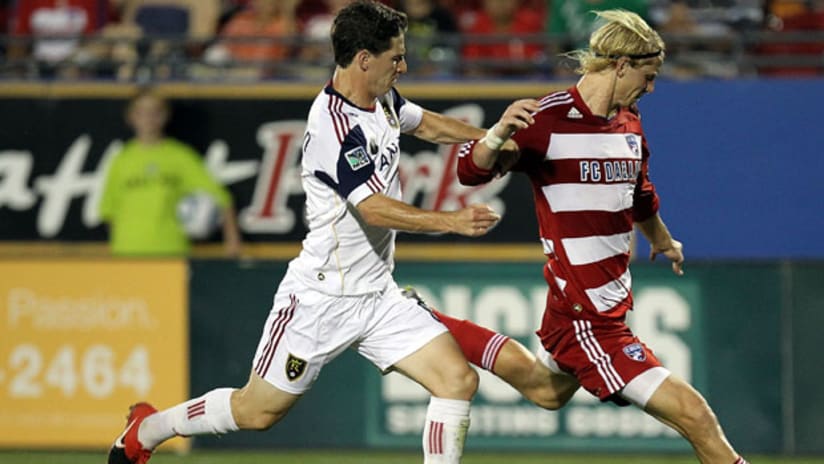Fundamentally, soccer is about time and space. If you have the first, you can create the second. If you create the second, then you can use the first.
If you have them both, you control the rhythm and tempo of the game. You make your opponents chase the play, always having to run themselves back into position to put out fire after fire after fire. And chances are, at some point, they’re going to be a step slow, a moment late, and you’ll engineer yourself a lead.
There are two main ways to create time and space. The first way we’ll call “the Reyna Way.” Just have one midfielder who’s better with the ball, has better understanding of where pressure is coming from and where potential outlets are, than anyone else. Claudio Reyna, and the few players like him, made the game “quiet,” to paraphrase Jermaine Jones. If anyone runs out of ideas, no worries: Just give the ball to Claudio. He’ll cycle it around, and the game won’t get away from you.
The other way to create time and space is to understand the context and import of every touch on the ball and movement off it as you advance from the back, through the midfield, and eventually up to the forwards. If he’s there, I go there. If the ball is played diagonally, I cut. If it’s over the top, I hold. If he switches play, I pinch in. And so on.
This is, to borrow an expression from Bill Simmons, “The Fundamentals Torture-Chamber.” This is the beauty of recognition, execution and the soccer hive-mind that’s created when a team is so well drilled and unselfish that they operate purely as a unit.
The reason FC Dallas haven’t lost since April isn’t because they’re more talented than anyone else in MLS. The reason Real Salt Lake are on a record home winning-streak isn’t because they have the best players.
The reason, in both cases, is the same: They “Fundamental” you to death for 90 minutes each and every time you step on the field with them.
Want three points? You’d better execute. Because if you blow an offside trap, you’re giving up a goal. Fail to account for a run? You’d better hope your keeper stands on his head to come up with a great save.
And never, ever turn the ball over deep in midfield.
The way the two teams go about putting their opponents on the rack is vaguely different. RSL’s 4-4-2 (or 4-3-1-2, if you want to get fancy with the whiteboard semantics) is designed around their ability to be flexible going forward and to stay all on one page when defending.
Play high, and they’ll beat you over the top. Defend deep against their speed, and they will make a concerted effort to play small-ball through the midfield (see last year’s MLS Cup final). The moment a defender or d-mid steps up a bit too far, whichever RSL midfielder is in position to capitalize—usually Javier Morales—slips inside and receives a diagonal ball.
Now he has time and space.
At that point the playmaker has the choice of crossing, shooting, putting in a diagonal through-ball of his own, or attempting to draw a foul. The ability to decide which of the above is the best bet, and do so quickly, is what has made Morales a perpetual MVP candidate and one of the best players in the league.
There’s also the collective ethos of “never let the perfect be the enemy of the good” when RSL go into the attack. Sure, a 25-yard bomb isn’t the best look at goal you can possibly get. But it’s not bad, and you never know. Take a shot when it’s offered, then get to work creating the next one.
Dallas, unquestionably 2010’s surprise team, do a lot of the same things as RSL. They attack you with small-ball relentlessly. They’re not afraid to go over-the-top. They act as a unit in defense.
But where the teams differ is how they progress into the final third. FCD stay wide and force you to defend the entire pitch, operating from the outside, in.
The tactical purpose of this is to draw defenders away from David Ferreira, FCD’s own MVP candidate. Dallas want to give him as much time and space as possible. The primary objective of any FCD opponent is to deny exactly that.
The Colombian #10 plays higher up the pitch than Morales does for RSL, just under a lone striker in a 4-1-3-1-1, which forces either the opposing d-mid to drop deeper (disrupting possession and counter-attack opportunities) or one of the center-backs to step up.
The second option is particularly dangerous, since in Jeff Cunningham, Brek Shea, Marvin Chavez, Milton Rodriguez and Atiba Harris, Dallas always have three athletes on the field that can get behind the defense in a flash, and usually from an unexpected angle. Their speed and ability to work in concert with each other—the Fundamentals Torture-Chamber again—means opposing defenses have less time to make the correct decision on any given attack.
Ferreira, with 13 assists on the year, is obviously adept at making those brief hesitations count.
How RSL attempt to minimize Ferreira should be where the game is decided on one end. Whether Dallas manage to deny Morales opportunities to slip the gap between d-mid Jackson Goncalves and their central defense will be the story on the other.
In both cases it’ll be a battle of, and for, time and space. Soccer stripped down to the fundamentals.

